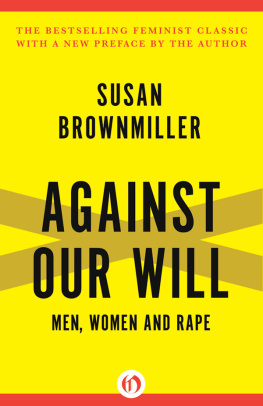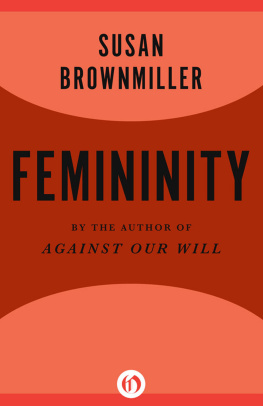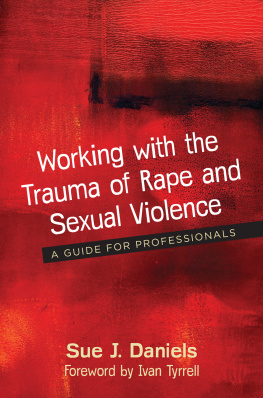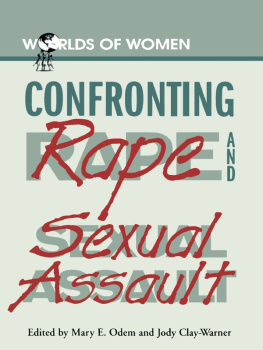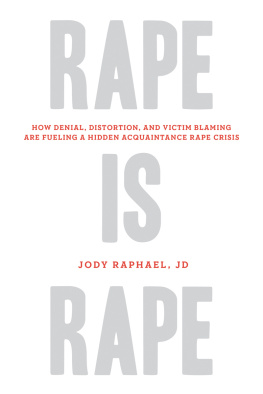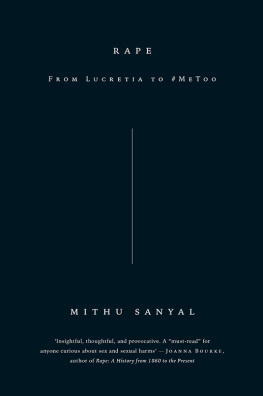
Against Our Will
Men, Women and Rape
Susan Brownmiller

Preface
Against Our Will was published in the middle of a feminist decade of theory and action when women overturned many hidebound assumptions about our ordained place in the social order. Id like to salute all the positive changes that can be traced to those years, but this is a preface to my treatise on rape so Ill stay on message.
A universal truth about movements for social change is that from a relatively secure vantage point later on, people wonder what the fuss was about, or how it began. I will tell you in one sentence. In the 1970s, unprecedented strategies against rapespeak-outs, crisis centers, twenty-four-hour hotlines, state-by-state campaigns to amend unfair criminal codeserupted across this country and spread through the Western world. Look at current international news stories about gang rapes in a public square and routine rape in war to see how male violence can operate without check. No, it was not that bad here in the 1970s, but I do observe that we seem to be fighting some of our old battles again.
The absolute brilliance and sine qua non of the American anti-rape movement was its focus on the victims perspectivea fresh idea in its day, unbelievable as that may sound. Public attitudes about rape and child molestation had been shaped entirely by menin psychoanalytic theories, in police investigations and courts of law, in popular novels and films, on television talk shows, in nightclub comedy routines, in dirty jokes and smarmy wisecracks, and in grandiose pronouncements that were put forward as scientific facts. Does that sound familiar to readers of present-day news?
Women had never dared to talk openly about a crime against their physical integrity that often was met with disbelief and which carried a heavy load of shame. Rape was something that women were afraid to mention. Big surpriseunmentionable subjects, for women, were all about the autonomy of womens bodies. Using the process of consciousness-raising that a few years earlier had helped bring abortion rights to the forefront, feminists started to grapple with sexual assault by speaking from their own experience.
As an organizer of two public events in 1971, the New York Radical Feminist Speak-Out on Rape, followed by a weekend conference on rape, I was both stunned and exhilarated by what I learned. A womans account of what she had gone through was diametrically at odds with the eras common narratives of eager consent and false accusation. My takeaway was that rape was a deliberate act of power, dominance, and humiliation committed by men with no moral compassand that most victims feared their attackers were going to kill them.
Four years later Against Our Will reached the bookstores. One of the tasks I had set for myself was to uncover the patterns and dimensions of rape in history that were buried in library archives. If you imagine that my research consisted of looking up rape in library catalogs, you are mistaken. I would have if I could have. Library catalogs of the erasturdy oak drawers of well-thumbed three-by-five index cardshad almost no entries for rape. But librarians knew the materials in their special collections, and they knew the arcane subcategories in the Dewey Decimal System where historical accounts of rape might be found.
I am extremely proud of one very long chapter titled War, which was prompted by a few news accounts of mass rape in Vietnam and Bangladesh. It occurred to me to collect as much historic evidence as I could about routine and pervasive rape in warfare. The good news is that humanitarian organizations and international courts now recognize and condemn rape as a common tool of warfare. The bad news, obviously, is that men continue to rape in war. In parts of the world where territorial wars are a way of life, soldiers do not yet see that what they do to noncombatants cannot be excused or explained by men will be men.
Large swaths of the globe still hew to traditional customs of rape and pillage in warfare, and to their age-old belief that women are property. So much more work needs to be done.
Some evolutionary biologists believe quite strongly in the grim inevitability of men will be men. A vocal handful of neo-Darwinians theorize that rape is a cost-effective strategy for males (embedded with drives for aggression, promiscuity, and reproduction) to spread their genes widely with a minimal amount of parental investment. What a fancy argument for rape, and for the failure to pay child support, as natural behavior! Those with a more hopeful frame of mind note that some human societies are infinitely more decent than others, and that behaviors of wanton cruelty and torture appear to be less acceptable than they were in the past. You can figure out where I stand on evolutionary imperatives.
To my shock, it turned out that my most controversial chapter was the one I titled I remain saddened to this day that a portion of the Left, blinded by its certainties and wedded to its neatly ordered priorities, chose to react to this chapter with rage, maintaining in pseudonymously written pamphlets and a few disruptions of my public speeches that a politically correct analysis of rape should begin and end with the horrific cases of Scottsboro and Emmett Till. Any further analysis was heresy, in their opinion. Read the chapter and see what you think.
Thanks to the laudatory attention Against Our Will received in the national media (the front page in weekly book review sections at a time when many newspapers had weekly book review sections; phenomenal TV and radio coverage) plus a twenty-one-city author tour followed by two years on the college lecture circuit, my book and I played a significant role in the groundbreaking effort to reverse the traditional wisdom on assaultive acts against women and children.
Are rape jokes making a comeback? I believe so. Are people still eager to question a rape victims credibility and smear her reputation? Oh yes. Do people still say feminists have no sense of humor? Yup.
And now let us applaud some amazing developments in the effort to combat sexual assault that could not have been anticipated several decades ago, for the usual reasons of shame and disbelief. In each of the three developments I cite below in chronological order, inventive strategies to reveal the truth and overturn the status quo were utilized by victims who could no longer remain silent:
- The recognition in law that sexual harassment in the workplace is a discriminatory practice that denies equal opportunity in employment. The term sexual harassment was coined on the campus of Cornell University in 1975.
- Brilliant actions against scores of dioceses of the Roman Catholic Church that had willfully protected, for decades, sexually abusive parish priests who preyed on the vulnerable youngsters they supervised and mentored in their religious duties. Instead of calling law enforcement when outraged parents complained at the diocese level, numerous bishops, archbishops, and cardinals had followed a secret strategy of transferring offender priests to other parishes. Predator priests broke into the headlines in 1992 after hundreds of men and women organized by SNAP, the Survivors Network of those Abused by Priests, started working together to heal their painful memories and stage daring confrontations. Their activism led to a wave of church bankruptcies resulting from civil lawsuits and to a continuing international scandal about church sex abuse and cover-ups of epic proportions.
Next page
